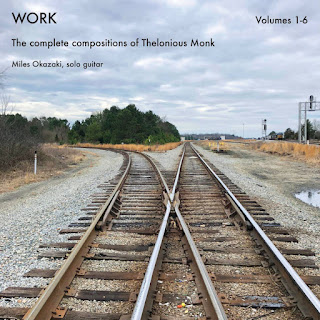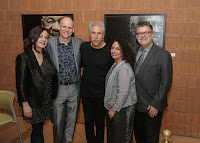 |
| Photo: Sara Pettinella |
 |
| Photo: Sara Pettinella |
 |
| Photo: Sara Pettinella |
For more information, go to arthirahara.com.
Here's a quartet track:
Over the past three decades or so, I have come to appreciate the work, the work ethic, and approach of saxophonist/composer Rich Halley. Based in Oregon, Halley has created his own music on small labels as well as his own (for the last eight years), and rarely tours beyond the West Coast. Still, his recordings are filled with life, with powerful meditations on the creative process, and impressive musicianship.
"The Literature" (Pine Eagle Records), credited to the Rich Halley 3, is the first time the saxophonist has recorded an album of non-originals. This is not just any random group of pieces but, as you should be able to tell from the title, Halley is exploring "classics": not literature but music from artists such as Thelonious Monk, Ornette Coleman, Jimmie Rodgers, Hank Williams, Duke Ellington, Charles Mingus, Sun Ra, Miles Davis, and the Carter Family. Eclectic to be sure Halley was exposed to all of this different music in his formative years.
Joined here by bassist Clyde Reed and drummer Carson Halley (his son), the 3 take this pastiche of music and make it their own. With the thick bass lines and robust (sometimes gentle) drumming, the music often dances. Listen to the opening "Little Willie Leaps" (M. Davis) - the trio jumps right, Halley leading the way with a tone that suggests Sonny Rollins yet an approach all his own. Because these 3 have worked together for a number of years, each musician can chart his own course. Reed's counterpoint bass and young Halley's splendid drum work, the music swirls and whirls but never loses its way. Monk's "Misterioso" follows and, again, note how the rhythm section does not confirm to the original rhythm section approach. Here, they sound like trio Air (Henry Threadgill, Steve McCall, and Fred Hopkins), respectful of the composition but definitely making the piece their own. "Mood Indigo" has a smilier feel, with a bluesy Coleman Hawkins-like tenor sax sound on the melody line. Note how Halley and Reed work in and around each other during the solo section.
 |
| Photos: Daniel Sheehan |
"The Literature" is no dusty collection of old tracks but a living, breathing, reminder that creative music has a great tradition continually worth exploring. The Rich Halley 3 does that and more. This is an hour well-spent!
For more information, go to www.richhalley.com.
Here's the opening track:
"Science Fair" (Sunnyside Records) brings together drummer Allison Miller and pianist Carmen Staff for an enjoyable adventure in modern music. With bassist Matt Penman making sure throughout that the foundation is sturdy, the co-leaders both supplied the material (Ms. Miller five, Ms. Staaf four). The "science" involved in this project includes chemistry, certainly mathematics and physics, but also a bit of magic. With two well-placed guests (tenor saxophonist Dayna Stephens on four tracks and trumpeter Ambrose Akinmusire on two), the music goes in various directions and never gets lost.
The program opens with a whoosh of sounds. All five of the musicians push their way into "What?!" until Ms. Miller puts down the most delicious of beats, Ms. Staaf colors the foreground with lovely piano figures, all leading up to Stephens and Akinmusire introducing the melody. The mood shifts for the powerful trumpet and drum conversation which leads to a tenor sax solo that starts off in a meditative manner before the drummer pushes Stephens a bit harder. Go back and pay attention at the piano often in the background. The lush figures and occasional rhythmic pulses stand out.
The piano is front-and-center on the next track, "Symmetry." After a soft introduction highlighted by Stephen's breathy reading of the melody, Ms. Staaf moves into the spotlight and her far-ranging solo is a highlight of the melody. Listen to Ms. Miller responds - this is chemistry of the highest order. The sax and trumpet return for Ms. Miller's "Weightless", the longest track (10:08), the episodic performance giving everyone her and his moment in the solo spotlight (save for the drummer who is the motor through most of it). Best of all, because of the crystal-clear recording, the mix by bassist Todd Sickafoose, and Dave Darlington's excellent mastering, you can hear everyone quite well. Make sure to hang around for the last few minutes and hear the emotional trumpet-piano duo.
 |
| Photo: Shervin Lainez |
The trio tracks stand out as well. From Ms. Miller's folky ballad "Ready Steady" (that opens with an enjoyable bass solo) to the lovely two-part ballad "Skyway" (also composed by Ms. Miller), the three musicians hold your attention. The latter track closes the album: infused with a gospel feel, it's a feature for Penman's fine solo at the beginning and also in the middle. Ms. Staaf's bouncy "MLW" rides in on Ms. Miller's exotic hand drumming. The pianist also dances here, the rhythmic pulse from her left hand providing the bottom (Penman sits this one out) while her right goes on a jaunty melodic adventure. "West of the Moon" (also from the pen of the pianist) takes its name from the standard "East of the Sun (and West of the Moon") and one can hear similarities in the chords and fragments of the melody. It's a tour-de-force for the trio.
"Science Fair" is very good music and great fun. If you're a big fan of Allison Miller, her playing here is superb. Carmen Staaf is music director for Dee Dee Bridgewater aa well as an excellent music educator. She's also a member of Ms. Miller's Boom Tic Boom and has worked with young vocalist Allegra Levy. Together, the two make impressive that goes beyond the mundane and take into accounts the myriad influences on the leaders and their collaborators. Give it a close listen.
For more information, go to allisonmiller.com and/or www.carmenstaaf.com.
The album will be released on September 18, 2018.
Here's that jaunty "MLW":
Here's that jaunty "MLW":
































